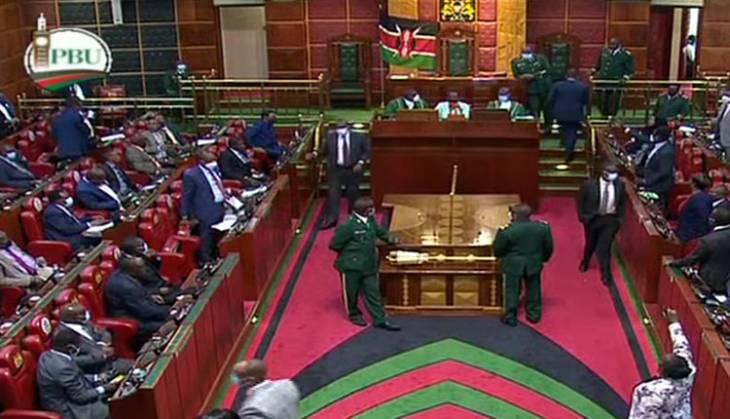Parliament is an institution of brains, not brawn
By Editorial.Team, February 3, 2022While separation of powers is an ancient theory of dependency and inter-dependency between the three arms of government – Executive, Judiciary and Legislature – it has developed its tentacles and formed the basis of modern democratic governments.
The Executive has the chief role of developing and implementing policy while the Judiciary is mandated with interpreting the law and the Legislature has a role of making law.
The Constitution of Kenya, 2010 describes the role of Parliament as having legislative authority, derived from the people and vested in Parliament. It further emphasises that no person or body, other than Parliament, has the power to make provisions having the force of law in Kenya. This article, therefore, dissects the role of Parliament and MPs as a social cultural subject in the wake of the war on the floor of the House during the debate on the Political Parties (Amendment) Bill and other periodic fights.
Parliament is a house of representation. Parliament is the face of the citizens. This is to say the composition of Parliament is a representation of the diversity of the citizens.
MPs, therefore, carry with them the interests and the issues of their constituency which requires brains not brawn. A member of Parliament is, therefore, required to have the ability to conceptualise issues and make a case in the House for the implementation of these issues.
The other role of MPs is to legislate. They formulate and make laws for the advancement of the country. This too does not require fists. It does not need one to shout. Rather, it requires men and women who can improve their arguments.
Parliament also has a role to provide the checks and balances against the other arms of government. Is it time therefore for Kenyans to look at the men and women entrusted with this crucial role.
The theories of social contract and democracy give power to the people. They therefore have the greatest role in determining the kind of parliament that we have. It is definitely a choice between brains and brawn. A choice between those who prefer intellectual warfare and those who resolve to argue using their fists.
What the should be the qualification of a member of Parliament? An MP needs to be a grown-up. This is to say there is need to go beyond the age of maturity requirement and cultivate a culture of grown up politics in the country. It is only children and teenagers who physically fight to settle an argument and find pride in the fighting. This behaviour should not be reflected in our Members of Parliament or at any level of government.
MPs need to be educated. It is hypocritical and a lie that we propound as a nation when we say that there are people who are born leaders and, therefore, do not need education. The truth is that it is only by being adequately educated that an MP can understand the systems, their role and acquire the necessary skills needed to perform their functions.
MPs also need to be dignified. I understand the name Mheshimiwa to be an individual of repute; a person who is above reproach; someone who shows and deserves respect. Yet I doubt if that is what is seen every time the so-called waheshimiwa turn the House into a boxing ring.
People like Winston Churchill, William Wilberforce and Nelson Mandela made great contribution in the world by the strength of their arguments.
Even as we condemn fist fights and shouting in Parliament, we should question the purpose and the strength of the Standing Orders and the code of conduct for members.
Is it not ironical that Parliament makes laws for the country yet the MPs do not have a simple code of conduct that regulates their behaviour and keeps them in check?
I think there is need to develop proper rules and guidelines for Parliament that include sanctions.
— The writer is an Advocate of the High Court of Kenya
